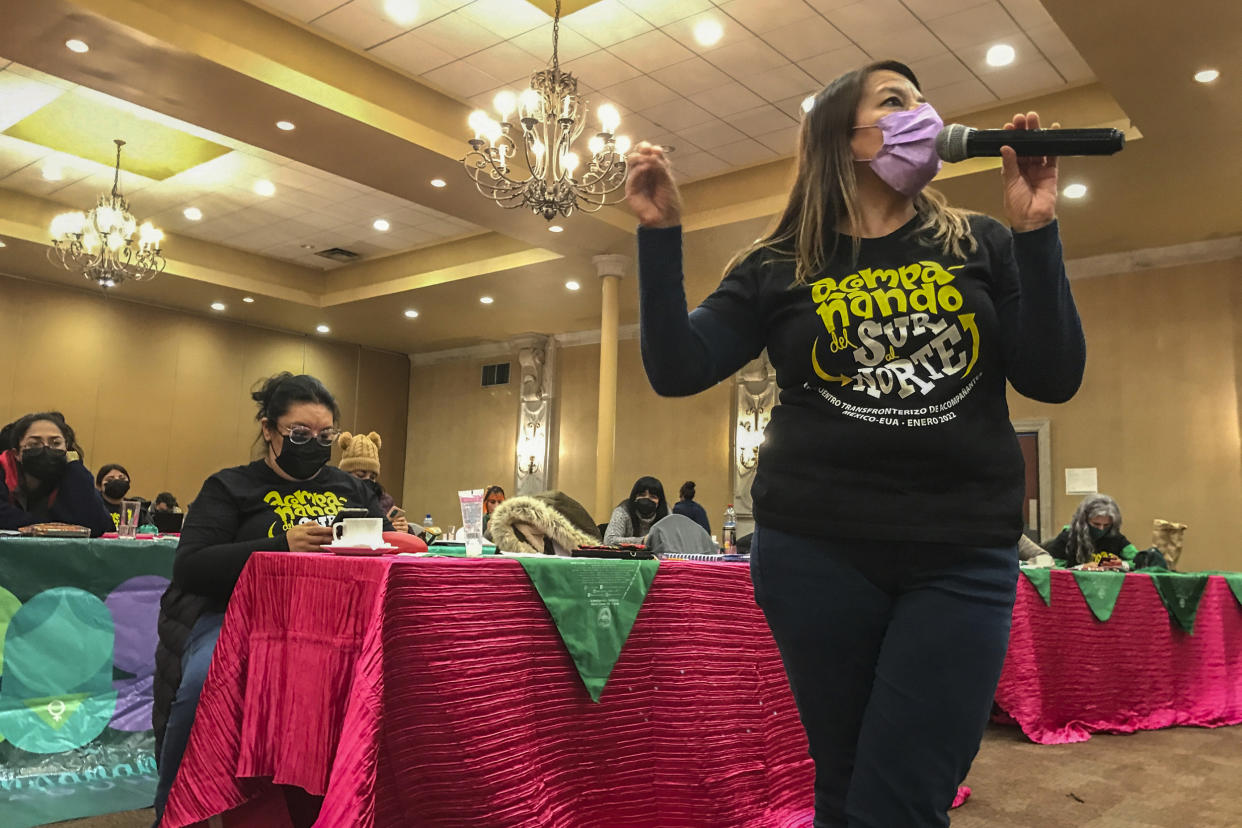Mexico clinics flooded with requests from U.S. women seeking abortion medication
An increasing number of U.S. women who are unable to access abortion services in their states are looking to Mexico after the fall of Roe v. Wade, according to Mexican abortion rights activists.
The activists say hundreds have flooded abortion rights organizations across the border with phone calls and social media requests seeking access to abortion medication and help with the process.
“We imagined this would happen, but not at the rate that it’s been happening,” said Sandra Cardona, founder of Red Necesito Abortar, Spanish for "I Need to Abort Network," an abortion rights group in Monterrey, Mexico.

Before Roe was overturned, it had previously been more common for Mexican women who could afford it to cross the border to seek abortion services in the United States. But after Mexico decriminalized abortion in September 2021 and with recent abortion restrictions in some U.S. states, Mexican activist networks say they have seen a rise in calls from desperate American women.
“When the decision fell, that was like a loudspeaker,” Cardona said. She said previously five to seven women from the U.S. were reaching out to her clinic for help per week, but now that number has shot up to 70 to 100 a week.
“You have to see the fear this has generated in the population,” she said.
“They never say they want an abortion,” Cardona said of the women who call. Instead, she said, they say how many weeks along they are and ask, “Will there be a problem?”
The four Mexican abortion rights groups interviewed said while the majority of the calls come from Texas, they have increasingly seen women reaching out from other states as well, including Oklahoma, Ohio, Florida and from as far away as Idaho and Wisconsin.
Verónica Cruz, the founder of Las Libres, Spanish for "The Free Ones," an abortion rights network that has been working in Mexico for 22 years, said that before the decision on Roe, about 10 U.S. women were reaching out to her group daily, but since then it has been 100 a day.
She said that in the last few months, her network has seen women who said they had been denied abortions even after being raped and in cases where their lives were at risk or their pregnancies had serious fetal abnormalities.
“It’s just brutal,” she said.

Even abortion networks further from the U.S. border are receiving more requests, indicating the distance some women are willing to travel for care.
Aborto Seguro Chihuahua, Spanish for "Safe Abortion Chihuahua," used to receive only two or three calls from people in the U.S. per month for information or assistance, co-founder Laura Dorado said. That number has risen to about 20 a month, even though the city of Chihuahua is not along the U.S. border, she said.
“Women who want to have abortions will have abortions, they will find a new way,” she said. “We’re here to hold their hand and accompany them.”
'Showing our solidarity'
The networks in Mexico are mostly connecting women with access to abortion medication, not procedures, and walking them through the process or providing a safe, comfortable space for them to go through the process. Abortion medication can be found over the counter in Mexican pharmacies.
Crystal Pérez Lira, founder of the Bloodys network in Tijuana, said the groups are there to help people with "whatever situation or questions they have.”
Some of the women are able to travel to Mexico to obtain the medication and then back to their own homes in the U.S, the activists said. Others are accompanied in Mexico by the activists. For women in the U.S. who cannot make the journey across the border, some abortion rights networks mail donated medications or work to deliver them directly to the women for free, according to the groups.
Dorado said women in the U.S. have also reached out to ask if the network can offer workshops to educate others on medication abortion.
Since its approval by the Food and Drug Administration in 2000, the medication combination of mifepristone and misoprostol has been a safe and effective option for women in the U.S. seeking abortion during the first 10 weeks of pregnancy. In 2020, medication abortion was used in more than half of the abortions in the U.S., according to the Guttmacher Institute, a research group that supports abortion rights. Mifepristone blocks progesterone, a hormone needed for the pregnancy to grow. Misoprostol causes cramping and bleeding to empty the uterus.
While the two-pill method has been approved in the U.S., the World Health Organization and the American College of Obstetricians and Gynecologists both note the use of a misoprostol-only method can also be used as an alternative if a patient cannot access both medications.
In December, the FDA said it will permanently allow patients to receive abortion pills by mail and the prescription via an online consultation.
Abortion rights opponents in several states have sought increased restrictions on medication abortion.
Many states require that physicians administer abortion medication. And 19 states require the clinician providing the medication to be physically present when it is administered, effectively prohibiting the use of telemedicine, according to the Guttmacher Institute.
Cruz of Las Libres said the groups guide women through WHO’s protocol for using abortion medication to safely end their pregnancies in their homes.
She said she hopes the networks can share their years of experience advocating in a country with strict abortion restrictions with women in the U.S.
“The only thing we are doing is showing our solidarity with the women who need it,” Cruz said. “Women have always had abortions, they will always have abortions and abortions will always be necessary. All the legal restrictions do is put people at risk.
